

8 qualities of remarkable employees. Forget good to great.
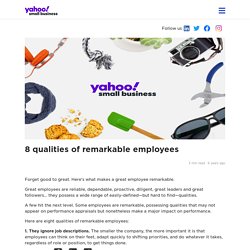
Here's what makes a great employee remarkable. Great employees are reliable, dependable, proactive, diligent, great leaders and great followers… they possess a wide range of easily-defined—but hard to find—qualities. A few hit the next level. Some employees are remarkable, possessing qualities that may not appear on performance appraisals but nonetheless make a major impact on performance. Here are eight qualities of remarkable employees: 1. When a key customer's project is in jeopardy, remarkable employees know without being told there's a problem and jump in without being asked—even if it's not their job. Cover Letter Help: Don't Make these Cover Letter Mistakes.
By Kim IsaacsMonster Resume Expert Your cover letter is the first thing employers see when they open your materials.
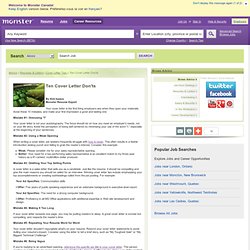
Avoid these 10 mistakes, and make your first impression a good and lasting one. Mistake #1: Overusing "I" Your cover letter is not your autobiography. The focus should be on how you meet an employer's needs, not on your life story. Mistake #2: Using a Weak Opening When writing a cover letter, job seekers frequently struggle with how to begin. Weak: Please consider me for your sales representative opening. Mistake #3: Omitting Your Top Selling Points. Team Management Skills. The Core Skills Needed to Manage Your Team Develop effective management skills.
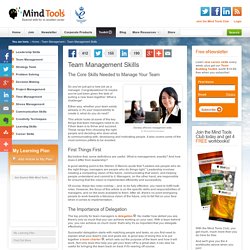
Preserving Integrity. Consistently Making the Right Choices Make the right choice every time. © iStockphoto/teekid You do not wake up one morning a bad person.

It happens by a thousand tiny surrenders of self-respect to self-interest. – American writer, Robert Brault Nancy's boss has just let her know that her client's order is about to leave the company's warehouse. Ethical Leadership. Doing the Right Thing Know in advance what you'd do. © iStockphoto We've seen some high profile ethical failures in the press in recent years.

It will be hard to forget the devastation caused by accounting fraud at the investment company run by Bernard Madoff, or the earlier frauds at Enron and Worldcom. People have also raised ethical questions over the welfare of some organizations' staff and suppliers. This highlights the extent to which it can be difficult for leaders to determine what's right and wrong. What we rarely see, however, are stories about the numerous companies that are managed by ethical leaders.
Leadership Styles. Choosing the Right Approach for the Situation Find out what makes a great leader, with James Manktelow & Amy Carlson.

From Mahatma Gandhi and Winston Churchill, to Martin Luther King and Steve Jobs, there can be as many ways to lead people as there are leaders. Fortunately, businesspeople and psychologists have developed useful frameworks that describe the main ways that people lead. When you understand these frameworks, you can develop your own approach to leadership, and become a more effective leader as a result. In this article, we'll highlight some of the common approaches to leadership that you can use. Note: These frameworks and styles of leadership are based on several different approaches to leadership. Useful Leadership Style Frameworks. Six Answers Interviewers Need to Hear to Hire You. By Peter Vogt During the typical job interview, you'll be asked a lot of questions.
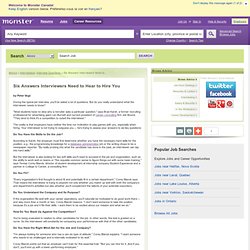
But do you really understand what the interviewer needs to know? "Most students have no idea why a recruiter asks a particular question," says Brad Karsh, a former recruiting professional for advertising giant Leo Burnett and current president of career consulting firm Job Bound. "They tend to think it's a competition to outwit the interviewer.
" The reality is that employers have neither the time nor inclination to play games with you, especially when hiring. Do You Have the Skills to Do the Job? According to Karsh, the employer must first determine whether you have the necessary hard skills for the position, e.g., the programming knowledge for a database administration job or the writing chops to be a newspaper reporter. Insight Center: The Next Generation of Global Leaders - Sponsored by Accenture. The Days of "Manager Knows Best" Are Ending - Sujai Hajela. Why Do Some Managers Fail? Why Do Some Managers Fail?
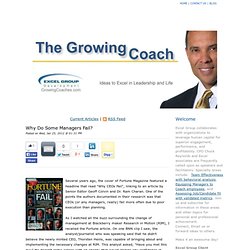
Posted on Wed, Jan 25, 2012 @ 01:31 PM Several years ago, the cover of Fortune Magazine fe atured a headline that read "Why CEOs Fail", linking to an article by Senior Editor Geoff Colvin and Dr. Ram Charan. One of the points the authors documented in their research was that CEOs (or any managers, really) fail more often due to poor execution than planning. As I watched all the buzz surrounding the change of management at Blackberry maker Research in Motion (RIM), I recalled the Fortune article. His point was that the new CEO's style came across as flat and uninspiring, which made one suspect that his strategy (which isn't new) would be as well. The mention of Heins' style was interesting. Likewise, when mangers work at achieving strategic plans by interacting with their direct reports, the use of a coaching style that is congruent with the style of the person being coached will result in much higher levels of engagement.